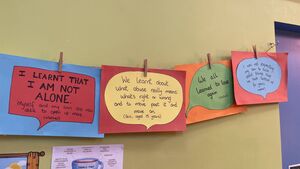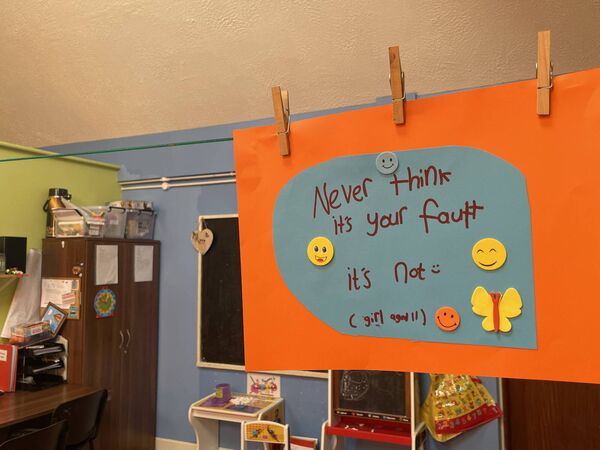Oasis House Women's Refuge - 'We are here'

Children's messages on a wall in Oasis House.
Oasis House is located on a quiet corner of Morrison’s Road in Waterford City. On a bright Thursday morning, Waterford News & Star were welcomed inside to meet with manager, Claire Coughlan, and assistant manager, Louise Kelly, and to have a talk about the services that are available at Oasis House for women and children who are affected by domestic violence.
The conversation came after a recent article in this paper referred to comments made during a council meeting that suggested women at risk of domestic abuse were being referred to McGwire House homeless hostel.
There was a fear that the comments might suggest that there are no spaces for women at risk of violence. Claire, Louise and all who work at Oasis House wanted to refute any suggestion of the sort.

As Claire said: “We just wanted to reassure people that is not the case – we are here. Women can phone us or call up to the service for support.
“We’re quite lucky in the sense that we are one of the bigger refuges at present in the country."
Oasis House have 12 crisis units and four safehouses. According to Claire: “The crisis units are for single women or women with children, and they vary in different sizes and capacity.
"Then we have four safe houses, which are a form of move on accommodation. We want to reassure people that we do have space.
"We’re often very busy. Sometimes, of course, it can be full but we will work very closely with other refuges if someone needs accommodation.”
Hospitals and gardaí often direct people to Oasis House for their wide range of services. Demand for services are ever growing – every year, more reports of domestic violence are logged, more applications are being made for Domestic Violence Orders from the courts.
For many women and children, Oasis House is a refuge in every sense of the word; they offer a 24/7 helpline, 24/7 drop-in support and information service, counselling, refuge accommodation, and a court accompaniment service. The court accompaniment worker helps a domestic abuse survivor navigate the legal system.
Claire said: “It can be a really daunting time for anyone, if they have to go to court to get an order. They might not know the system.
She went on: “Most refuges, I’d say all of them have a court accompaniment worker for anyone experiencing domestic abuse, who has knowledge of the process of applying for domestic abuse orders and a good rapport with court services as well.”
Louise commented: “Having someone with you who has this knowledge and experience can make all the difference in supporting the person to navigate what is an extremely difficult situation.”
There is an outreach team dedicated to help women throughout Waterford city and county, meeting those for example who do not have access to transport and/or live in remote, rural areas, at a location that is safe and convenient for them.
Oasis House is now running a 12-week group work programme, TLC KIDZ, for children and mothers affected by domestic violence.
Mothers and children may need to live at the refuge for a period of time, which is safely guarded and monitored 24/7. There is a large playroom filled with toys, games, video games, arts and crafts; toys you’d see in any child’s playroom. On the walls there are posters made by the children during group sessions, containing messages on what they’ve learned.
One of the first stages of domestic abuse is isolation. A perpetrator will try to convince their partner that their family, friends or colleagues are a malign influence or simply do not care about them.
They’ll convince their partner that they are the only person in the world who can understand and love them. This leads to isolation. Once the victim of abuse realises what has happened, feelings of shame and embarrassment can hold them back from reaching out to their loved ones for help.
At Oasis House, survivors learn how to reach out and rebuild their lives and trust in others. As one child wrote on a poster: “I learnt that I am not alone.”






